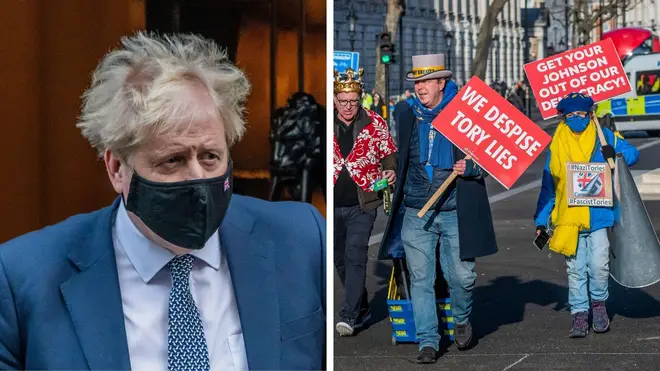
Paul Brand 10am - 12pm
12 January 2022, 21:58

Boris Johnson is facing mounting calls to resign after he was forced to issue a humiliating apology over his attendance to a lockdown-breaching drinks event at No10 - but could the under-fire Prime Minister be forced out?
Mr Johnson has insisted he believed the "bring your own booze party" in May 2020 was a "work event" which was within the guidelines, but many Tories say he should now resign.
The Prime Minister has insisted he will not step down from his role despite the partygate scandal - which has taken over politics in the last six weeks.
However, if he does succumb to pressure from an unhappy Conservative party, what would happen?
Tory MPs and members would hold a leadership contest to choose a new leader - and therefore the new Prime Minister, without an election.
This happened in 2019, when Theresa May resigned.
Read more: Top Tories call for Boris to quit over 'partygate,' but PM has support of 20 ministers
Read more: Not an 'easy day' for Boris Johnson: Jacob Rees-Mogg defends PM in partygate scandal

'It felt rather half-arsed': Tory MP reacts to PM apology
The appointment of a new party leader can take up to a month and includes strenuous campaigning and jostling for the position.
When the leadership contest is decided within the party, the outgoing Prime Minister will go and offer their resignation to the Queen, and advise she appoints the new leader of the party as Prime Minister.
Mr Johnson has so far refused to resign - so how else could he lose his role as PM?
Vote of no confidence
Without resigning, one way MPs can remove a prime minister from office is by tabling a motion of no confidence.
A vote of no confidence is triggered if 15% of Conservative MPs write to Sir Graham Brady, the chair of the 1922 Committee of Tory backbenchers, to formally seek one.
This means, if the 1922 Committee receives 54 letters from backbench Conservative MPs, a vote of no confidence would be triggered.
"That this House has no confidence in Her Majesty's Government" is the wording used for a no-confidence motion.
Should Mr Johnson gain the support of at least half the parliamentary party, which would be 180 MPs, then he would remain in office.
No new confidence vote can be triggered for at least 12 months.
The 1922 Committee was meeting this afternoon to discuss Mr Johnson's next steps.
Read more: 'I know the rage they feel': Boris Johnson's full statement over partygate

Ben Kentish on Boris Johnson's partygate apology.
Read more: Police 'in contact' with Cabinet about possible probe into lockdown party
Can the Queen fire the prime minister?
Technically, yes - the Queen has the power to oust the prime minister - if absolutely necessary.
Although she has the power, this hasn't been seen for centuries.
If Mr Johnson lost any future motion of no confidence and then refused to resign, the Queen may be forced to intervene.
Could he ride out the storm?
Things do look tricky for Mr Johnson, but the Prime Minister could still turn things around.
He has already survived a series of scandals, blunders and controversies which could have sunk other political careers.